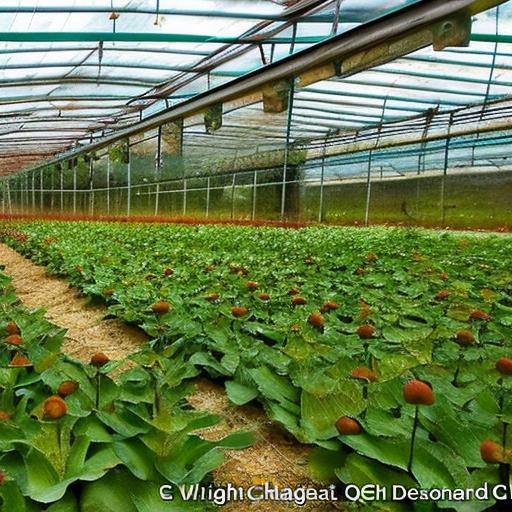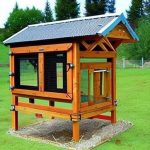Keeping chickens in a greenhouse is a growing trend among backyard chicken keepers. It involves providing a controlled environment for the chickens to live in, while also benefiting from the greenhouse’s ability to regulate temperature and humidity levels. This allows for year-round chicken keeping, regardless of the outside weather conditions. With the increasing interest in sustainable living and self-sufficiency, more and more people are turning to backyard chicken keeping as a way to have a constant supply of fresh eggs and meat.
Key Takeaways
- Keeping chickens in a greenhouse can provide a sustainable source of fresh eggs and meat.
- Raising chickens in a greenhouse can help regulate temperature and humidity levels, benefiting both the chickens and plants.
- Before keeping chickens in a greenhouse, consider factors such as space, ventilation, and potential health risks.
- Designing a greenhouse for chicken keeping involves creating a suitable environment for both chickens and plants.
- Choosing the right breeds of chickens for a greenhouse environment can ensure their health and productivity.
Benefits of Raising Chickens in a Greenhouse
There are several benefits to raising chickens in a greenhouse. One of the main advantages is the ability to have fresh eggs and meat year-round. With a greenhouse, you can control the environment and ensure that your chickens have optimal conditions for laying eggs consistently. This means you can have a steady supply of fresh eggs, even during the winter months when chickens may not lay as frequently.
In addition to fresh eggs, raising chickens in a greenhouse also allows for the production of fresh meat. By controlling the environment, you can ensure that your chickens grow at a steady rate and have access to proper nutrition. This means you can have high-quality, homegrown meat that is free from antibiotics and hormones.
Factors to Consider Before Keeping Chickens in a Greenhouse
Before embarking on the journey of keeping chickens in a greenhouse, there are several factors that need to be considered. One important factor is zoning laws and regulations. It is essential to check with your local authorities to ensure that keeping chickens in a greenhouse is allowed in your area. Some areas may have restrictions on the number of chickens you can keep or may require specific permits.
Another factor to consider is proper ventilation and lighting. Chickens produce a significant amount of moisture and ammonia through their droppings, which can lead to poor air quality if not properly ventilated. It is important to have adequate ventilation in the greenhouse to ensure fresh air circulation and prevent the buildup of harmful gases. Additionally, proper lighting is essential for the health and well-being of the chickens. Natural light is ideal, but if that is not possible, artificial lighting can be used to simulate daylight hours.
Designing a Greenhouse for Chicken Keeping
When designing a greenhouse for chicken keeping, there are several factors to consider. The type of greenhouse you choose will depend on your specific needs and preferences. There are different types of greenhouses, such as hoop houses, lean-to structures, and freestanding structures. Each type has its advantages and disadvantages, so it is important to research and choose the one that best suits your needs.
Insulation is another important consideration when designing a greenhouse for chicken keeping. Proper insulation will help regulate temperature and prevent heat loss during colder months. This can be achieved through the use of double-layered plastic or glass panels with insulating properties. Additionally, the flooring of the greenhouse should be easy to clean and provide good drainage to prevent the buildup of moisture.
Choosing the Right Breeds of Chickens for a Greenhouse Environment
Choosing the right breeds of chickens for a greenhouse environment is crucial for their health and well-being. Some breeds are better suited for colder climates, while others thrive in warmer conditions. It is important to choose breeds that can tolerate the temperature and humidity levels that are present in your greenhouse.
Additionally, it is important to choose breeds that are disease-resistant. Chickens kept in close quarters, such as in a greenhouse, are more susceptible to diseases and parasites. By choosing disease-resistant breeds, you can minimize the risk of illness and reduce the need for medications or treatments.
Feeding and Watering Chickens in a Greenhouse

Proper nutrition and hydration are essential for the health of chickens kept in a greenhouse. It is important to provide a balanced diet that includes a mix of grains, proteins, and fresh fruits and vegetables. There are different types of feed available, such as pellets, crumbles, and mash. It is important to choose a feed that is appropriate for the age and breed of your chickens.
Water is also crucial for the health of chickens. It is important to provide clean, fresh water at all times. There are different types of waterers available, such as gravity-fed waterers and nipple waterers. It is important to choose a waterer that is suitable for the number of chickens you have and that can be easily cleaned and refilled.
Maintaining Temperature and Humidity Levels in a Greenhouse
Maintaining proper temperature and humidity levels in a greenhouse is essential for the health and well-being of chickens. Chickens are sensitive to extreme temperatures and high humidity levels, so it is important to regulate these factors.
There are several methods that can be used to regulate temperature in a greenhouse. These include using fans or vents to circulate air, using shade cloth or reflective materials to reduce heat buildup, and using heaters or insulation to provide warmth during colder months.
Humidity can be controlled by providing proper ventilation and using dehumidifiers or fans to circulate air. It is important to monitor humidity levels regularly and make adjustments as needed to ensure optimal conditions for the chickens.
Cleaning and Sanitizing a Greenhouse for Chicken Keeping
Proper cleaning and sanitizing are essential for preventing the spread of diseases in a greenhouse. Regular cleaning helps remove dirt, droppings, and other debris that can harbor bacteria or parasites. It is important to clean all surfaces, including floors, walls, and equipment, with a disinfectant solution.
Sanitizing is also important to kill any remaining bacteria or parasites. This can be done by using a sanitizing solution or by exposing surfaces to sunlight or heat. It is important to follow proper cleaning and sanitizing procedures to ensure the health and safety of the chickens.
Potential Challenges and Solutions for Keeping Chickens in a Greenhouse
Keeping chickens in a greenhouse can come with its challenges. One potential challenge is maintaining proper ventilation and air quality. Poor ventilation can lead to the buildup of harmful gases and moisture, which can cause respiratory issues in chickens. Regularly checking and cleaning ventilation systems can help prevent these issues.
Another challenge is preventing the spread of diseases and parasites. Chickens kept in close quarters, such as in a greenhouse, are more susceptible to diseases. Regular monitoring, proper nutrition, and good hygiene practices can help prevent the spread of diseases and parasites.
Conclusion and Final Thoughts on Keeping Chickens in a Greenhouse
Keeping chickens in a greenhouse can be a rewarding and sustainable hobby. It allows for year-round chicken keeping and provides a constant supply of fresh eggs and meat. By considering factors such as zoning laws, ventilation, and lighting, you can create a suitable environment for your chickens.
Choosing the right breeds, providing proper nutrition and hydration, and maintaining temperature and humidity levels are essential for the health and well-being of your chickens. Regular cleaning and sanitizing help prevent the spread of diseases, while monitoring for potential challenges allows for quick solutions.
Overall, keeping chickens in a greenhouse is a fun and rewarding way to have a sustainable source of fresh eggs and meat. It allows you to take control of your food production while also enjoying the companionship of these fascinating creatures. So why not consider starting your own backyard chicken keeping adventure today?
If you’re considering keeping chickens in a greenhouse, you may also be interested in learning how to insulate a chicken coop. Insulating your coop is essential for maintaining a comfortable and healthy environment for your feathered friends, especially during colder months. This informative article from Poultry Wizard provides valuable tips and step-by-step instructions on how to properly insulate your chicken coop to ensure the well-being of your flock. Check it out here for all the details you need to create a cozy and insulated space for your chickens.
FAQs
What is a greenhouse?
A greenhouse is a structure made of glass or plastic that is used for growing plants in a controlled environment.
Can you keep chickens in a greenhouse?
Yes, you can keep chickens in a greenhouse as long as it is well-ventilated and has enough space for the chickens to move around.
What are the benefits of keeping chickens in a greenhouse?
Keeping chickens in a greenhouse can provide them with a warm and protected environment, which can be especially beneficial during colder months. Additionally, the chickens can help fertilize the plants in the greenhouse and provide fresh eggs.
What are the potential drawbacks of keeping chickens in a greenhouse?
If the greenhouse is not well-ventilated, it can become too hot and humid for the chickens, which can lead to health problems. Additionally, chickens can be messy and may damage plants in the greenhouse if they are not properly contained.
What should you consider before keeping chickens in a greenhouse?
Before keeping chickens in a greenhouse, you should consider the size of the greenhouse, the number of chickens you plan to keep, and the ventilation and temperature control systems in place. You should also ensure that the chickens have access to food, water, and a suitable nesting area.
Meet Walter, the feathered-friend fanatic of Florida! Nestled in the sunshine state, Walter struts through life with his feathered companions, clucking his way to happiness. With a coop that’s fancier than a five-star hotel, he’s the Don Juan of the chicken world. When he’s not teaching his hens to do the cha-cha, you’ll find him in a heated debate with his prized rooster, Sir Clucks-a-Lot. Walter’s poultry passion is no yolk; he’s the sunny-side-up guy you never knew you needed in your flock of friends!







